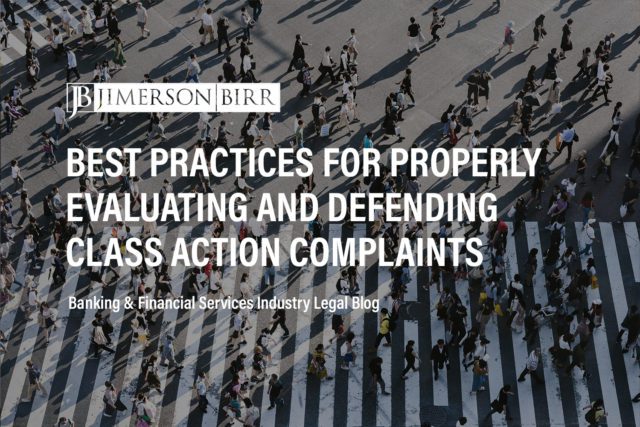What does hands-on class action defense entail?
Invoking a hands-on defense approach means taking an active role in the early stages of the lawsuit by conducting a thorough investigation of the case, developing a strategy to defeat the class certification, and filing appropriate motions to dismiss, strike or limit the class action claims. This approach intends to identify potential issues in a class action lawsuit early in the case’s life cycle, allowing the defense to establish applicable defenses, challenge class certification, pursue decertification methods, and file dispositive motions.
To apply the hands-on defense approach in Florida, the defendant must identify potential defenses to the plaintiff’s claims, including individualized issues that may defeat class certification, establish the merits of the claims, or limit the damages. The defendant must also challenge the plaintiff’s expert testimony, evidence, or method of proof and use dispositive motions to resolve the case before trial.
For example, in Walmart v. Dukes, 564 U.S. 338 (2011), the U.S. Supreme Court held that the proposed class of female employees alleging gender discrimination in pay and promotions at Walmart stores did not satisfy the commonality requirement under Federal Rule of Civil Procedure 23(a)(2). The Court reasoned that the individualized decisions made by Walmart’s numerous store managers were insufficient to establish a common issue of law or fact across the proposed class. Consequently, the Court ruled that the class could not be certified.
Need help with a class action defense? Schedule your consultation today with a top class action defense attorney.
In Florida, which laws and regulations apply to class action defense?
The following Florida and federal laws guide invoking a hands-on defense approach in class action defense:
- Florida Rule of Civil Procedure 1.220: This rule governs class action proceedings in Florida state courts, setting forth the requirements for class certification, notice, and related procedures.
- Federal Rule of Civil Procedure 23: This rule regulates class actions in federal courts, outlining the prerequisites for class certification, notice, and related procedures.
- Florida and federal case law: Courts interpret the state and federal rules of civil procedure in class action cases, guiding invoking a hands-on defense approach, including applicable defenses, challenges to certification, decertification methods, and dispositive motion practice.
By understanding and applying these laws and regulations, defendants in class action litigation can effectively employ a hands-on defense approach to protect their interests.
What are the strategic benefits of hands-on defenses in class action litigation?
Invoking a hands-on defense approach in class actions offers the following strategic benefits:
- Early resolution of the case: A hands-on defense approach can lead to an early resolution by addressing and establishing applicable defenses, challenging certification, and pursuing dispositive motion practice. This approach can also reduce the length and cost of litigation.
- Improved client satisfaction: Early establishment of applicable defenses, challenges to certification, class decertification methods, and dispositive motion practice can improve client satisfaction by reducing the length and cost of litigation. It lets clients focus on their core business activities rather than the litigation.
- Stronger negotiating position: The early establishment of applicable defenses, challenges to certification, class decertification methods, and dispositive motion practice can lead to a stronger negotiating position for the defense in class action litigation.
- Minimizes risk: An early hands-on defense approach can mitigate risk by identifying and addressing potential weaknesses in the case and using dispositive motion practice to eliminate claims. This approach can also protect the defendant’s reputation by limiting the amount of negative publicity generated by the litigation.
- Greater control over the litigation: A hands-on defense approach allows the defense to take control by proactively addressing the case’s issues, establishing applicable defenses, challenging certification, and pursuing dispositive motion practice. This approach can lead to a more favorable outcome for the defendant.
- Increased efficiency: An early hands-on defense approach can increase efficiency by eliminating unnecessary claims, reducing the scope of the case, and limiting the discovery process. This approach can also improve the predictability of the case’s outcome, which can benefit the defense.
What steps should counsel take to invoke a hands-on defense, and how will class action plaintiffs generally respond?
Class action defendants should follow these steps:
- Assess the case: The first step to successfully invoking a hands-on defense approach is to assess the case, including the plaintiff’s allegations and evidence and the legal and factual issues involved. Early assessment helps the defendant identify potential legal defenses and dispositive issues early in the litigation.
- Early establishment of applicable defenses: Defendants should focus on the early establishment of applicable defenses to prevent certification of the class or to narrow the scope of the claims. These defenses may include challenging the named plaintiff’s standing, asserting preemption, and challenging the sufficiency of the pleadings.
- Making challenges to certification: Defendants should challenge class certification by showing that the requirements of Rule 23 of the Federal Rules of Civil Procedure are unmet, such as lack of commonality, typicality, and adequacy of representation.
- Class decertification methods: Defendants should use class decertification methods if the court has already certified the class. Decertification may include arguing that the class has become unmanageable or that individual issues predominate over common issues.
- Dispositive motion practice: Defendants should use dispositive motion practice, such as motions to dismiss, summary judgment, or motions for judgment on the pleadings, to dispose of the case before trial. Practice and preparation can save significant costs and resources and increase the defendant’s bargaining power in settlement negotiations.
Class action plaintiffs generally respond to a defendant’s invoking a hands-on defense approach by:
- Challenging the defendant’s legal and factual arguments: Plaintiffs may challenge the defendant’s legal and factual arguments by filing opposition briefs and supporting evidence.
- Asserting counterclaims and affirmative defenses: Plaintiffs may assert counterclaims and affirmative defenses, such as breach of contract, fraud, or unjust enrichment, to pressure the defendant and increase the defendant’s settlement value.
- Opposing dispositive motion practice: Plaintiffs may oppose dispositive motion practice by arguing that there are genuine issues of material fact or that the defendant’s legal arguments are not meritorious.
- Seeking class certification or recertification: Plaintiffs may seek class certification or recertification by addressing the defendant’s arguments and showing that the requirements of Rule 23 are met.
When a set of facts is appropriate to meet the requirements of a hands-on class action defense, there are many paths a claimant may take. We are value-based attorneys at Jimerson Birr, which means we look at each action with our clients from the point of view of costs and benefits while reducing liability. Then, based on our client’s objectives, we chart a path to seek appropriate remedies.
To determine whether a unique situation may necessitate litigation, please contact our office to set up your initial consultation.
Frequently Asked Questions
- Can class action defendants use expert witnesses during the litigation process?
Yes, class action defendants can engage expert witnesses to provide testimony on various aspects of the case, such as damages, class certification issues, and the merits of the claims. Expert testimony can be crucial in challenging class certification or supporting the defendant’s defenses.
- How can class action defendants minimize their liability exposure?
Class action defendants can minimize their exposure by engaging in early case assessment, retaining experienced counsel, developing a strong defense strategy, and pursuing alternative dispute resolution methods, such as mediation and arbitration.
- Are there any unique aspects of Florida law that affect class action litigation defense?
Florida law contains specific procedural rules for class actions, such as Florida Rule of Civil Procedure 1.220. Therefore, class action defendants need to understand and comply with these rules and any other state-specific statutes or case law that may impact their defense strategy.
Have more questions about a class action defense-related situation?
Crucially, this overview of hands-on class action defense strategies does not begin to cover all the laws implicated by this issue or the factors that may compel the application of such laws. Every case is unique, and the laws can produce different outcomes depending on the individual circumstances.
Jimerson Birr attorneys guide our clients to help make informed decisions while ensuring their rights are respected and protected. Our lawyers are highly trained and experienced in the nuances of the law, so they can accurately interpret statutes and case law and holistically prepare individuals or companies for their legal endeavors. Through this intense personal investment and advocacy, our lawyers will help resolve the issue’s complicated legal problems efficiently and effectively.
Having a Jimerson Birr attorney on your side means securing a team of seasoned, multi-dimensional, cross-functional legal professionals. Whether it is a transaction, an operational issue, a regulatory challenge, or a contested legal predicament that may require court intervention, we remain a tireless advocate every step of the way. Being a value-added law firm means putting the client at the forefront of everything we do. We use our experience to help our clients navigate even the most complex problems and come out the other side triumphant.
If you want to understand your case, the merits of your claim or defense, potential monetary awards, or the amount of exposure you face, you should speak with a qualified Jimerson Birr lawyer. Our experienced team of attorneys is here to help. Call Jimerson Birr at (904) 389-0050 or use the contact form to schedule a consultation.

We live by our 7 Superior Service Commitments
- Conferring Client-Defined Value
- Efficient and Cost-Effective
- Accessibility
- Delivering an Experience While Delivering Results
- Meaningful and Enduring Partnership
- Exceptional Communication Based Upon Listening
- Accountability to Goals











